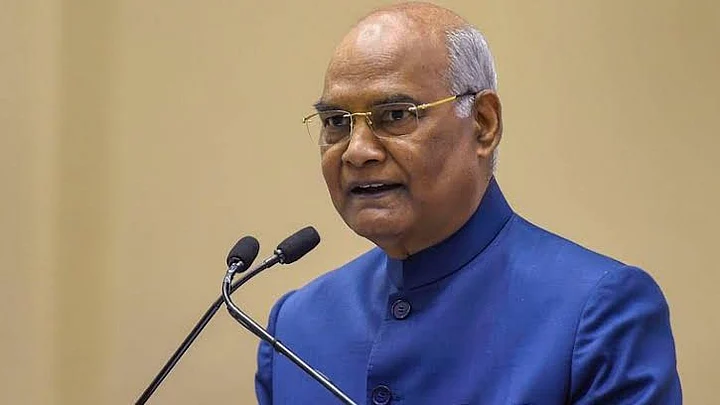President Ram Nath Kovind is in Kanpur on a four-day visit. But before reaching Kanpur, he stirred up a bit of a controversy. Speaking at a public event, he said that while he does earn a healthy salary of Rs 5 lakh a month as President of India, he is not able to save much, as he pays Rs 2.75 lakh as tax every month.
He pointed out that, as a result of this, he makes fewer savings than several other officials in positions of public service.
“The President is the highest paid employee of the country, and he also pays taxes. But someone will say that you get five lakh rupees... everyone talks about that. Out of that, every month, quarter to three lakh comes out. So, how much is left? Our officers and others get more than what is left. The teachers who are sitting (at the event), they all get more.”President Ram Nath Kovind
This statement has sparked an interesting discussion on the salary and other benefits given to India’s Head of State. Is the President’s salary taxable? If yes, how much tax should he be paying? Does he receive any tax benefits, considering the significance of the office he holds? We tried to answer these questions by looking at India’s taxation laws and policies.
First, President's Salary Is Not Exempt From Income Tax
The President’s (Emoluments And) Pension Act, 1951, lays down provisions for the salary, emoluments, and post-retirement benefits for the person holding the office of the President of India.
The President’s salary is charged from the Consolidated Fund of India. In 2017, the Government of India had decided to increase the salary of The President of India from Rs 1.5 lakh per month to Rs 5 lakh per month.
In addition to the salary, the President receives other allowances, which include free housing and free medical treatment facilities (for life).
As per the reading of section 14 (heads of income) and section 10 (incomes not included in the total income) by various judgments of the Supreme Court, any income which is not specifically exempted from income tax under a law in force is considered to be taxable.
Neither the Income Tax Act nor the President (Emoluments And) Pension Act specifically exempt the salary of the President of India from taxation. Therefore, it appears that President does pay tax on his income. But there is not much clarity on what is the nature of the President’s income – is it given as a “salary” or in the form of “income from other sources.”
However, there is one way through which the President can avoid paying income tax. As per the Voluntary Surrender of Salaries (Exemption of Taxation) Act, 1961, if the President chooses to surrender his salary to the Consolidated Fund of India, he would be exempted from taxation.
But this exemption is not restricted to the President of India. Any person, whether their salary comes from the Consolidated Fund of India or not, who chooses to surrender their income to any of the funds administered by the Government of India, is exempted from paying income tax.
So, How much Income Tax Should the President Pay?
In order to calculate the income tax payable by the President, the following things are considered: his senior citizen status, whether he received income as “salary” or as “income from other sources.” and whether he has made any investments to save on tax liability.
Considering the absence of information on the President’s investments or the nature of his income, Chartered Accountant-turned-lawyer Deepak Joshi tried calculating the tax payable by the President, as per the tax slabs for salaried employees.
“The tax computation for the current financial year for an income of Rs 5 lakh per month comes to about Rs 17.60 lakh annually, translating to Rs 1.47 lakh tax deduction every month, approximately. This calculation assumes that the President has opted for a concessional tax rate regime. But it doesn’t consider any deductions on account of eligible investments & tax concessions, as the same is not in public domain. However, if the President hasn’t opted for the concessional tax rate regime, the tax liability increases to Rs 18.42 lakh, translating to a monthly tax bill of Rs 1.53 lakh approximately.”Deepak Joshi
So, where does the figure of “Rs 2.75 lakh” come from? Joshi raises the conjecture that the President might be including the 30 percent pay-cut* due to COVID in this “tax claim.”
“Considering that the monthly tax liability doesn’t add up to Rs 3 lakh, as stated, it maybe possible that the President had considered the 30 percent pay-cut to arrive at the figure of Rs 3 lakh. A 30 percent pay cut on a Rs 5 lakh income means that the President is already getting Rs1.5 lakh less, in hand. The tax liability calculated earlier along with this pay cut tallies the figures provided by the President. This probably was what he intended to convey.”Deepak Joshi
(*President Kovind had said that he will forego 30 percent of his salary for a year, in order to make more funds available for the country’s fight against COVID-19.)
(At The Quint, we question everything. Play an active role in shaping our journalism by becoming a member today.)
